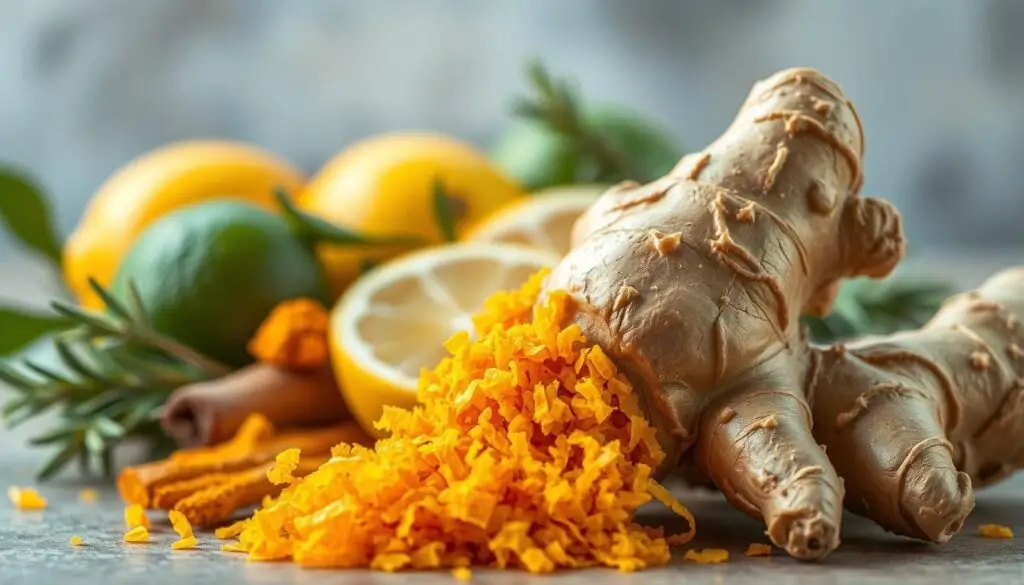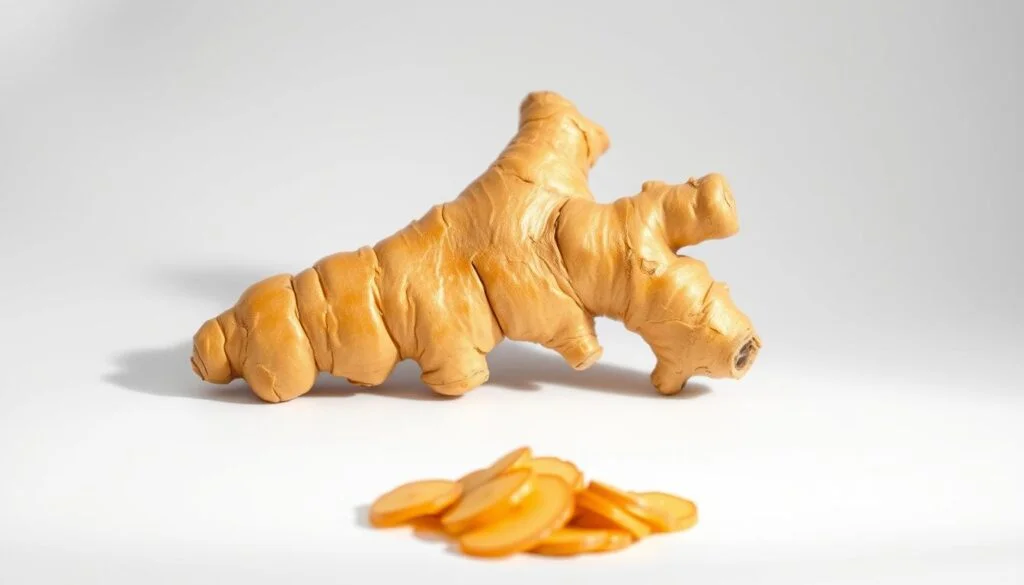Ginger tea immunity benefits have made this herbal drink a popular choice for boosting overall wellness.
Ginger has been important in old-time medicines for a long time, and people like it more because it helps with many health issues. This helpful root was used to promote good health; how well it works has been known around the world.
Ginger is good for health because it contains antioxidants and anti-inflammatory components. It helps the body in many ways, from maintaining good digestion to relieving pain, offering the medicinal value of ginger that enriches life when added on a daily basis.
This article highlights why ginger is good for health and how you can add it to your daily routine so that you easily benefit from its properties.
Key Takeaways
Why Ginger Has Always Been a Go-To Healing Root
Ginger has held a special place in traditional medicine for centuries. Across different cultures and generations, it was valued not just for its flavor but also for its ability to ease common health troubles.
Where It All Began
Originally from Southeast Asia, ginger became a staple in the remedies of ancient civilizations like China, India, and Greece. Back then, people used it to calm upset stomachs, ease nausea, and reduce inflammation. In Traditional Chinese Medicine, ginger was even seen as a “warming” herb—believed to improve blood flow and help the body fight off cold.
What Modern Science Says
Fast forward to today, and research has shown that ginger’s benefits are more than just tradition. Compounds found in ginger—like gingerol and shogaol—have strong anti-inflammatory and antioxidant properties, which support everything from pain relief to cellular protection.
| Compound | What It Does |
|---|---|
| Gingerol | Reduces inflammation |
| Shogaol | Eases pain and swelling |
| Antioxidants | Protect your cells from damage |

Proven Ginger Benefits for Health
Ginger has been one of the main ingredients in the medicine of ages and centuries, and today modern science begins to justify the health benefits of this miraculous root used in different cultures for its medicinal properties. Its benefits extend to multiple aspects of health.
It Is Anti-Inflammatory
Ginger contains compounds such as gingerol that are very potently anti-inflammatory. This gives it good properties as a natural treatment to reduce inflammation and pain, especially in conditions such as arthritis. In this way, chronic inflammation can be controlled with regular consumption of ginger, maybe in the form of ginger tea.
Improving Digestion Naturally with Ginger
For centuries, people have turned to ginger as a natural remedy for stomach discomfort and poor digestion. Its unique compounds help the body break down food more efficiently and improve how nutrients are absorbed. Whether you’re sipping ginger tea or adding fresh slices to your meals, it can offer gentle support for a happier digestive system.
Ginger’s Role in Easing Pain
Beyond the kitchen, ginger has earned its place as a natural solution for reducing muscle pain and soreness. Its anti-inflammatory properties have been shown to soothe aches, making it especially helpful after workouts or long physical tasks. For many, it’s a trusted remedy to ease tension in the body without relying on medication.
Heart-Friendly Benefits
Ginger also supports heart health in several ways. It can help lower bad cholesterol, prevent dangerous clots, and keep blood flowing smoothly. These heart-friendly effects make ginger a smart addition to your daily routine—whether in tea form or as part of your meals—helping protect your cardiovascular health naturally.
At a Glance: Why Ginger is Good for You
| Benefit | What It Does |
|---|---|
| Fights Inflammation | Helps with joint pain and reduces inflammation throughout the body |
| Supports Digestion | Eases nausea, supports gut health, and improves nutrient absorption |
| Relieves Muscle Pain | Soothes soreness and supports post-workout recovery |
| Boosts Heart Health | Lowers bad cholesterol, improves circulation, and reduces clot risk |
How Ginger Enhances Your Immunity
The unique combination of bioactive compounds and anti-inflammatory properties ginger presents make it possible to boost immunity. It should thus be added to any diet that focuses on keeping the immune system in good shape.
Antioxidant Nature and Free Radical Fighting
Since antioxidants are the agents that fight free radicals in the body, it means ginger contains antioxidants. Free radicals (unstable molecules) can cause oxidative stress on the body’s cells; this leads to cell damage and many forms of disease. Ginger’s antioxidant properties help to neutralize these free radicals thereby reducing the oxidative stress a person is subjected to, hence keeping one healthy.
The ginger antioxidants comprise vitamin C and beta-carotene, working together to stimulate the body’s natural defense mechanisms. Taking ginger on a regular basis will increase your body’s capacity to resist harmful pathogens and keep you in good health.
Ginger for Cold and Respiratory Infection
Ginger is used in the normal course to relive symptoms of colds and infections on the respiratory tract. Inflammatory conditions, since congestion, and a sore throat have recently been dramatically reduced by ginger. Warm ginger also helps good circulation in the body that could help in recovering.
Studies have proven that the active compounds of ginger are able to modulate the immune response so that it appropriately combats pathogens within the respiratory tract. Regular consumption may reduce the frequency and severity of colds and flu in people.
Supporting Gut Health for Better Immunmunity
Large parts of the immune system are in the gut, so good immunity depends on a healthy gut. Studies have shown that ginger helps to reduce inflammation within the gut and promotes a balanced microbiota, thus contributing positively to gut health. Healthy microbiota conditions help in healthy functioning for the immune system; for instance, they help in antibody production and other immune cell functions.
Ginger supports gut health and thereby indirectly boosts immunity. One can add ginger into the diet simply by adding it to meals or consuming it as a tea. This is an easy way to support your immune system.

The Ultimate Guide to Benefits of Ginger Tea
Discover the power of ginger tea, an easy and strong drink that can change your health. For many years, ginger tea was important in old ways of healing and now science shows it works. This complete guide helps you learn the simple way to make ginger tea talks about how its taste can change and tells you when the best times are to drink it for great help.
Preparing ginger tea is simple and needs few ingredients. Take fresh ginger root and water, add honey or lemon to your taste if you want. Just take thin slices of ginger, boil it in water for 5-10 minutes and then strain the tea. The quantity of ginger can be adjusted as per the desired level of spiciness.
Tip: Use a bigger piece of ginger or keep it steeping longer for stronger tea.
Flavor Variations and Add-ins
Ginger tea is very flexible and you can change it according to many flavors. Some popular additions are lemon, honey, cinnamon, and mint. Trying different mixes can help you find the right cup for yourself.
Lemon and honey for a comforting, tangy change
Cinnamon for an additional anti-inflammatory increase
Mint for a fresh, cooling feeling
Best Moments to Have Ginger Tea
Timing can help maximize the benefits of ginger tea. Taking it in the morning will give you a good start by kicking up your metabolism, and taking it before bed will help you relax and aid digestion. Experiment and figure out what works best for your routine.
Hot Vs. Cold Ginger Tea Benefits
Both versions have their merits. Hot ginger tea is great for a sore throat and runs what we commonly call a cold, whereas cold ginger tea may be more refreshing and rehydrating in warm months.
BenefitHot Ginger TeaCold Ginger TeaSoothes Sore ThroatYesRelieves Cold SymptomsYesHydratingNo
Creative Ways to Add Ginger to Your Daily Diet
Ginger can be incorporated into your diet in so many different ways because it is such a flexible ingredient. Its flavor is unique, and it offers health benefits that make it an excellent addition to the wide range of dishes that could take from sweet treats to savory meals. In this section, we take a look at how you can add ginger to your daily routine.
Fresh, Dried, and Powdered Ginger
Knowing the various types of ginger is important for using it well. Fresh ginger works great for teas, stir-fries, and baked goods as it gives a strong flavor. Dried ginger has more intense flavors and it is mostly used in teas and soups. Powdered ginger is easy for baking and making mixtures of spices. Each form has its own advantages and uses letting you pick the best one for your requirements.
Infusing your smoothies and juices with ginger is an amazing upgrade for the nutritional value of your drinks. An infusion of fresh ginger can impart a sparkling, lively accent to a favorite fruit smoothie. Try infusing ginger along with turmeric, and lemon, then the flavors for an anti-inflammatory beverage will utterly blow your mind. Be creative and find out which combination suits you best.
Cooking with Ginger: Sweet and Savory Dishes
This spice can have features of both sweet and savory ingredients. Its savory application includes stir-fries, curries, and marinades by which it contributes to these dishes an added layer of flavor and some heat. It may appear in the capacity of a baking ingredient in products such as cookies, cakes, or pies, giving these foods a special taste. No matter if you are cooking and preparing a main course meal or a dessert, ginger will add both taste and health to the meal.
Considering Ginger Supplements and When to Use Them
For the dietarily handicapped, trying to integrate ginger by mouth appears as quite a task; thus, ginger supplements become a rather convenient choice. This kind of supplement comes diversified, appearing in forms such as capsules and powders. It is most recommended for people seeking to gain the anti-inflammatory abilities of ginger or any other digestive support.
However, a healthcare professional’s opinion would be crucial before embarking on a supplementing regime.
Conclusion: Healthy Habit of the Day: Ginger
Having ginger in your diet on a regular basis makes a great difference to the health and wellness condition of your body. This is because ginger contains many benefits like anti-inflammatory characteristics, support for digestive health, and the capability of relieving pain, making it a wonderful supplementary inclusion in a good lifestyle.
Ginger is essential for the immune system, and it has antioxidants which provide strength to the body and it also has antimicrobials, which fight against colds and respiratory infections. Taking ginger as a part of your health routine on a daily basis will raise your immunity; thereby cutting down the probability of falling sick.
Drink ginger tea, or include ginger in your food in the form of fresh ginger, or take ginger supplements; the ways are unlimited to make efficient use of this multi-benefit root daily and derive several advantages out of it.
Get going with your ginger journey today and witness how marvelously it enhances your general well-being, especially in immunity.
FAQ
Ginger is well known for its many health benefits, thanks to its natural anti-inflammatory and antioxidant properties. It helps support digestion, soothes pain, boosts the immune system, and even aids in managing cholesterol for better heart health.
How can you add ginger to your daily routine?
One simple way is by drinking ginger tea. You can make it fresh by boiling slices of ginger in water, or add powdered ginger to your favorite tea. Some people like to blend ginger into smoothies or fresh juices for an extra health kick. Ginger also works well as a seasoning in both sweet and savory dishes.
Ginger is also great for easing digestion—it helps reduce gas and bloating, making your tummy feel more comfortable. It’s been used for centuries to calm nausea and improve overall gut health.
Are there any side effects?
Generally, ginger is safe for most people. However, consuming large amounts might upset your stomach or interact with certain medications. So, if you have any health conditions or take medication, it’s a good idea to check with your doctor first.
You can use fresh ginger or dried ginger powder—it’s all about your taste preference. Just remember that powdered ginger might have a slightly different flavor.
Is ginger tea helpful for colds and respiratory issues?
Yes, ginger tea is often used as a natural remedy for colds and respiratory problems because of its soothing, anti-inflammatory effects.
Does ginger relieve heartburn?
Many people find ginger helpful in easing heartburn symptoms.
How does ginger benefit heart health?
Thanks to its ability to reduce inflammation and lower cholesterol, ginger supports a healthy heart.


